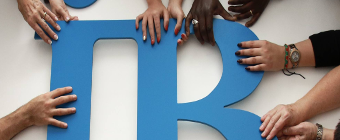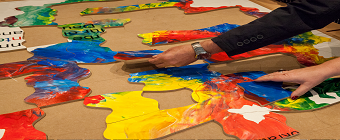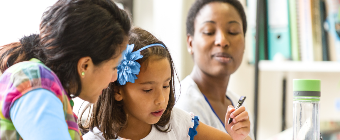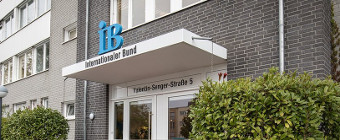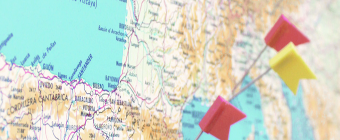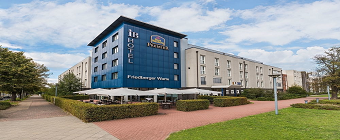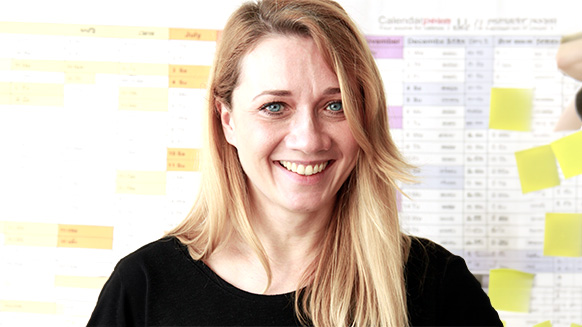Maria Wojtacha has been Director of the IB Polska Foundation in Krakow since 2019. The foundation's mission is to provide comprehensive support to marginalized people. Among other things, it runs the Multicultural Center of the City of Krakow. This is the first point of contact for migrants in the city.
Since the outbreak of the war in Ukraine, Maria and her team, including more than 10,000 volunteers, have helped some 200,000 refugees from Ukraine. In this interview she speaks about her experiences from the past two years and what the polish population can do to make a difference for the people from Ukraine.
Maria, you and your team started supporting Ukrainian refugees from the very beginning of the Ukraine war.
How did your people first react to the arrival of the refugees?
I think the Polish community responded fantastically. We were able to provide everyone who came with a place to stay, with food, clothing, medicine and access to doctors, kindergartens and schools in a very short time. The law was adapted to the situation very quickly too. I think it is worth noting that the first ones to provide assistance were private individuals, who with their cars drove to the border and took people from Ukraine to their cities and homes.
Did you personally come into contact with refugees right at the beginning?
In 2022 practically each of us hosted people from Ukraine who fled the war to Poland at our homes. It is almost impossible to not have had personal encounters. Of course, the staff of our Foundation also made professional experiences, as we spent practically the whole of 2022 providing support and assistance in our office, warehouses, information points, etc.
This all seems like a very generous and warm welcome. Have most of them now – after two years - more or less managed to settle into their new life?
Of course, the fact that the war continues is very difficult and does not allow you to fully acclimatize and start a new life. If you are worried about your loved ones, family, friends who are left behind, who are fighting, you are not able to be fully here and now.
How do the children cope with all these insecurities? Are there any stories or events that have particularly touched you?
There are plenty of stories and I and each of the foundation's employees remember many of them. But paradoxically to survive the worst moments we tried to forget them very quickly; each such situation was very difficult for us emotionally and 2022 did not allow us moments of weakness. However, every person to whom we donated food, clothing or a kind word has stayed with us forever - especially the children!
Do you have something like a code of conduct on how to deal with these issues?
We have the rule in our Foundation to not photograph our beneficiaries or tell their stories during our relief efforts, out of respect for them and their situation, which none of us would want to find ourselves in. From the very beginning, we wanted this assistance to be provided with the utmost respect for the privacy and trauma of these people. Certainly, the families I hosted at my home and their stories are closest to me, but I would not want to use their tragedy to violate their privacy. These are stories that I carry within me and that will stay with me forever.
What is being done to help the Ukrainian refugees integrate?
In Krakow, we have avoided large reception centers. All people are now accommodated in apartments, some in
hostels, but most of them are already leading independent lives. Our role now focuses on running a community center, where we organize numerous integration activities and language courses, and provide career counseling.
Psychological, legal and information assistance for people from Ukraine is still available. Numerous integration programs are carried out by NGOs and also by individuals. Considerable financial support is provided by the program of UN agencies present in Poland. We try to do everything we can so that people from Ukraine regain agency and can live a normal life, and someday, if they so desire, return home.
What long-term solutions are being discussed to improve their situation?
Education, integration, language learning. The most important thing is that all the solutions we want to apply should be flexible because the situation is very dynamic. We should be full of understanding for every decision the people from Ukraine make – for a sudden return as for the decision to stay. Lets not forget: Wherever they are, they are starting a new life.
Can the Polish population do anything to make life easier for the refugees?
I think the most important thing is to be there for and with them so they don't feel like strangers. They should know that they are wanted in Poland: You are safe, stay as long as you want and need! We are in this war together and together we are against it.
What do you personally want for the future?
I am still in contact with each person who lived with me and I think and even hope very much that we will meet again someday. We are all set to have coffee in Ukraine, sometime in Lviv. May we be able to do so soon!
Further Information on IB Polska:
https://ib-polska.pl/aktualnosci/raport2022/ (2022)

